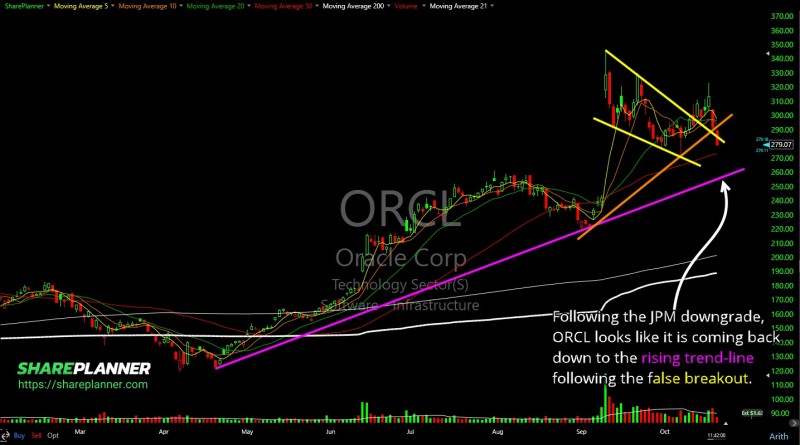Oracle (ORCL) shares are under pressure as a JPMorgan downgrade triggers a technical pullback. After attempting to break higher from consolidation, ORCL is now losing momentum. The key question: will the rising trendline that's held since May provide support?
Oracle Faces Pressure After Analyst Downgrade
JPMorgan's bearish call has shaken confidence, and the chart reflects it. According to analysis from trader Ryan Mallory, Oracle looks headed back toward its rising trendline—a critical support level near $265 that's anchored the uptrend for months.

The stock briefly popped above resistance around $330 in what looked like a breakout, only to reverse quickly. Classic false move. Now it's back below short-term moving averages with bulls on the defensive. The pattern is textbook: a symmetrical wedge between $270 and $330, a fake-out higher, then a swift rejection bringing sellers back in control.
Chart Analysis: Technical Weakness Emerging
After a solid summer rally, Oracle entered a compression phase with converging trendlines forming a wedge. The brief break above resistance became a trap, and that level now acts as overhead resistance. The rising trendline from spring lows near $265 is the next logical support—it's held before and could again. The 50-day moving average has flattened while the 200-day keeps climbing, suggesting the long-term structure remains intact despite short-term weakness. Volume shows heavier selling recently compared to the rally phase, confirming increased distribution. If ORCL stabilizes at the trendline, there's potential for renewed momentum. But a clean break below $260 opens the door to deeper correction toward $240.
Broader Context: Downgrade and Market Sentiment
JPMorgan cited concerns about Oracle's near-term growth in cloud infrastructure and software, where competition from Microsoft Azure and AWS remains intense. Revenue momentum has slowed enough to make investors cautious. Still, Oracle's long-term story around AI-driven cloud services, deep enterprise relationships, and recurring revenues keeps institutional interest alive. The downgrade is a short-term headwind, not a fundamental breakdown.
 Eseandre Mordi
Eseandre Mordi

 Eseandre Mordi
Eseandre Mordi


